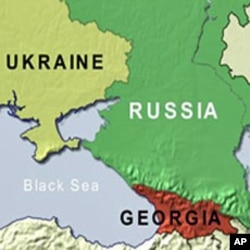Public opinion surveys indicate current President Viktor Yushchenko is trailing several other candidates as the country prepares to vote in presidential elections Sunday, January 17. The two front runners are former Yushchenko ally and prime minister, Yulia Tymoshenko, and Viktor Yanukovich, leader of the "Party of Regions" in the Ukrainian parliament.
During his five-year presidency, Mr. Yushchenko has steered a distinctly pro-Western course, seeking membership in the European Union and in the North Atlantic Treaty Organization - or NATO.
Russia has consistently criticized Mr. Yushchenko's pro-European policies and strongly opposed Ukraine's NATO membership bid.
James Sherr, with the London-based research organization, Chatham House, says there are two reasons for Moscow's position.
"Ukraine, for Russia, is not just a neighbor. Ukraine, for Russia, is part of Russia's own identity. Kiyv and Rus is the origin of the Russian, as well as the Ukrainian state - that's the way Russians see it. So any movement by NATO into Ukraine is seen, at least emotionally, as a direct encroachment on Russia itself," he said. "And the second issue is that behind NATO they [the Russians] see the United States and U.S. power - and they remain as convinced as in the past that it is in the U.S. national interest to weaken Russia as an authentically independent countervailing pole in the international system," he said.
Many analysts say if pre-election public opinion surveys are correct and current president Yushchenko is defeated, that would mean potentially better relations with Russia.
"With the exception of Yushchenko, most of the politicians, including all of those vying for the presidency, and certainly the two major candidates, are arguing for, in one way or another, a balanced policy that would attempt to create a constructive, productive relationship with Russia," said Robert Legvold of Columbia University. "Some tilt more in favor of focusing on Russia, like the leader of the Communist Party [Petro] Symonenko and Yanukovich, as the head of the 'Party of Regions.' And others, like Tymoshenko and a few other candidates focus on the European option as well. But there is nobody who is saying that we ought to choose one side - East - over the other side - West - or vice-versa," he said.
In the last presidential election in 2004, Russia openly supported Viktor Yanukovich, who was declared the winner in a run-off with Viktor Yuschenko. But hundreds of thousands of Yushchenko supporters took to the streets, protesting the results, which were subsequently declared fraudulent by the Ukrainian Supreme Court and international monitors. In a second election, Mr. Yushchenko defeated Mr. Yanukovich.
Robert Legvold says this time around, the Russian leadership is far more guarded.
"They obviously are very interested in who is going to win this election, but they don't appear to feel that they have a horse in this race that they need to go to lengths to support," he said. "I think they would be perfectly content if Tymoshenko wins, they know that Yanukovich, who in the past has been their preferred candidate, would not do their bidding, that in the end he will defend Ukraine's interests as he sees it. And if that means cutting deals with the European Union or with the West, he will do it. So I think the Russians are more or less comfortable with what's going to come out of this election," he added.
Experts say sources of friction between Kiyv and Moscow will remain whoever is elected president of Ukraine, such as the long-term, unresolved question of the Russian Black Sea fleet in Sevastopol. But analysts say the strong anti-Russian views as espoused by President Yushchenko will no longer be part of the Ukrainian political landscape.
Watch a VOA Ukrainian Service analyst roundtable discussion on the election. (In English)










